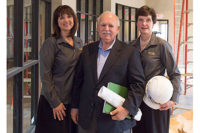
It is often said, in life, you can’t please everyone. In the business world, companies strive heavily to please as many of their customers as possible all of the time. When a company stretches its focus to include more and different customers, many times, that ideal — pleasing all the customers all the time — becomes a path to imminent failure. Ideas get bogged down, because the company cannot prioritize properly or does not react quickly enough to stay on the “good list” with every customer.
Yet, companies such as Dinuba, Calif.-based Ruiz Foods, a manufacturer of frozen Mexican foods, shine as an example of how to grow without outstretching the initial goals and strategies. Ruiz Foods serves a wide variety of products through an assortment of marketplace channels and has carved out its place in each of those channels.
Whether it’s Tornados sold from convenience-store (C-store) roller grills, 40-count boxes of Taquitos sold in warehouse-club stores, family-pack Chimichangas or Burritos, Quesadillas and Taquitos sold in retail freezer cases, the products Ruiz Foods supplies are backed by decades of entrepreneurial spirit and innovation tied to the company’s core values.
“The majority of our products go toward that mainstream frozen-food grocery shopper,” explains Bryce Ruiz, president and co-CEO of Ruiz Foods. “Moms looking for products for their families are a key target, whether they’re shopping [in a retail store or club store].
“[We have] our standard line of burritos, taquitos and now family meals — pretty much anything that is Mexican food, we have a variety under our El Monterey brand.”
Ruiz Foods has a long history of working with its customers to provide the best for both sides, but recent company growth has forced Ruiz Foods to step up, in a sense, to fulfill a greater responsibility in the partnership. It’s a role that Ruiz Foods relishes.
“We’ve taken a greater ownership role over thinking about how to lead our category in terms of product innovation and design, and not relying as much on the customers to give us the insights,” Ruiz says. “And I think that’s our obligation as the No. 1 brand. Our customers are looking for that, and we have to accept that role — our job is to have the insights and bring theinnovation.
“We have the systems and the team to think like a ‘big guy,’ but if we choose to, we can do things as quickly as we want to, and a heck of a lot quicker than the big guys.”
Increased ratings
Ruiz Foods may be best known for its El Monterey retail brand, but Ruiz says within approximately the last five years, the company added C-stores as a major focal point in its search to provide innovative products.“We’d always dabbled in foodservice with institutional packs and vending, and somewhat in C-stores with our burritos, but when we created the innovative Tornados product, which is made to be heated on the roller grills, we believe we created a phenomenon,” he adds. “We took, for many [stores], real estate that was underutilized if even utilized at all — some customers were even contemplating taking the roller grills out — said we’d give it a try, and we created Tornados.”
One of the main concerns for Ruiz Foods, however, with the Tornados product was the presence of a C-store mainstay: the roller grill hot dog. Ruiz says it was something the company had to work around, in order to get its innovative product space on the grill, given that most C-stores would not want a product that would cannibalize the hot dog business. In response, Ruiz Foods got creative about its market strategy and decided to break in to the breakfast daypart via the roller grill.
“Who’s selling hot dogs in the morning? Probably not a lot of stores, so they were less resistant to putting Tornados on in the morning,” Ruiz says. “That moved things forward to the point where, now in a lot of places, you’ll see two roller grills — one for hot dogs and one for Tornados.”
In most cases, Ruiz adds, hot dog sales at their customers’ stores have not suffered, and in some, Tornados have actually created consumer awareness of the roller grill offerings. The two items coexist very nicely in those stores that carry both, he says.
Tornados, as well as their relationship with other roller grill products, provide an example of how Ruiz Foods strives to work with its customers to grow the category, says Mark Hannay, senior V.P. of sales, for Ruiz Foods.
“Everything we’ve done, particularly in terms of the Tornados, was focused on how to get more volume and grow the overall business for our customers through innovation and high quality,” he explains.
Ruiz Foods offers approximately 20 varieties of Tornados for C-stores, with the stable of flavor offerings always growing to keep the category fresh and exciting for the consumers. These flavors sometimes include seasonal and limited-time-only types of products.
“We have a lot of consumer research we use,” Hannay says. “We look at menu trends, and obviously, we’re all consumers ourselves. There’s a lot of interaction, and our senior team meets once a week to really dialog what’s going on in the marketplace.”
Spin-off showcase
Many of Ruiz Foods’ products piggyback off each other. Items such as Taquitos, Tornados, Burritos, Chimichangas and the new Chimi Rolls often are interconnected, as Ruiz Foods looks to capitalize on bridging successful products and processes from one channel to another, where applicable.In the retail section, the El Monterey brand can be found on a variety of products, including Taquitos, Burritos, Chimichangas, Family Meals and other Mexican foods. But, challenges remain in the category, regardless of company position in the marketplace.
“We still have a lot of work to do on brand awareness, even though we’re doing a good job of it,” Ruiz says. With each new product Ruiz Foods launches, it builds that brand awareness across multiple channels.
Glenn Lee, CFO, says that Ruiz Foods’ R&D group has been excellent at understanding the flavor of Mexican food and applying it to various technologies, such as the roller grill or microwave.
“We’re really trying to provide a really good solution for moms or for people on the go that is a good value, good for you and has a good flavor profile,” he says. “There are a lot of products out there that are very expensive to the consumer versus what we give them, and they don’t fully realize that.”
He adds that’s been probably the greatest challenge Ruiz Foods sees in the marketplace today: that consumers don’t see the value that its products bring, and simply assume that all frozen Mexican-food products are all the same.
“Consumers may look at it as being a very cheap gut-filler, and that’s not what El Monterey provides,” Lee says, adding that Ruiz Foods does not make products that the company’s team members and executives would not themselves eat, whether one is talking in terms of flavor, value or even food safety.
In the R&D department, the company has put together a team of specialists who have great industry experience, but more importantly, are not afraid to go out on to the production floor and formulate products there, rather than strictly in the lab.
“What you end up with is real products — not something wonderful that could be created in a kitchen but then could never be manufactured,” he says. “The consumer would never see that product. But we come up with a concept and work with [the operations] team to make it happen.”
Ruiz believes that the company’s ability to think big but act small gives it the key advantage in the market. Because the company aims to be ahead of the curve when it comes to product innovation in its segment, it is always open to new ideas and concepts, especially when they develop out of, or even create, long-term relationships with Ruiz Foods.
“As much as we want our customers to realize that we can think big and do things in a big way but at the same time do things on a smaller scale and be pretty nimble, we also want the same thing out of our suppliers,” Ruiz says. “It’s an important message to note that, if anyone has ideas as a supplier of proteins, we’re [open to hearing them].”
Ruiz Foods’ legacy revolves around the building of relationships with its vendor partners. Case in point: its annual Vendor Summit event. Every year, for the past six, Ruiz Foods has invited all of its vendors to the event, which features a day-long strategy presentation and business update.
“As Ruiz Foods gets bigger, we need to formalize how we communicate with our vendor partners as well as our team members, and it can get challenging as we grow,” Ruiz says. “Even though they may not be able to connect with Bryce Ruiz as much as they were able to connect with Fred Ruiz years ago, it’s still very clear that the family is still leading the organization hands-on, and it’s our obligation to maintain that culture.”
Part of that obligation includes keeping quality and food-safety demands of the suppliers to Ruiz Foods’ requirements. Ruiz Foods has guidelines that each supplier must meet in the products it supplies, and Ruiz Foods also does regular vendor inspections, explains Brian Miller, senior V.P. supply chain for the company.
“We make sure that our standards in-house are much higher than whatever regulatory standards may be,” he says. “We have 2,600 team members in our facilities, but in our mind, they’re 2,600 plant managers, 2,600 quality-assurance folks and 2,600 owners.”
Adding 'bandwidth'
Keeping focus across the channels is made easier by the fact that every employee and vendor is tuned in to the goals and strategies of the company overall.“Part of what we’re trying to communicate to the industry is that we have capabilities that I think the big guys wish they had, in that we can respond in a personal manner — we don’t go through a bureaucracy to get things done,” Lee says. “If Mark [Hannay] has a problem from sales, Brian [Miller]’s team from operations is there, almost before Mark even knows he has a problem. It’s incredible how his organization gets things done.”
Lee’s example is a microcosm of the teamwork model of the company’s culture, as well as its ability to bend and flex its processing schedules to ultimately meet the needs of its customers. It helps that all three of the company’s plants can manufacture pretty much any of Ruiz Foods’ products, which until 2005, when the company’s Denison, Texas, facility opened, was a more difficult issue.
“There’s a lot of power in having locations in different areas,” Miller says. Ruiz agrees, explaining that Ruiz Foods’ customers have relayed a sense of comfort now that the company has increased its capabilities.
“The first question is, is there redundancy?” Ruiz says. “There is with El Monterey. There is that flexibility that [customers] can be confident that they will be supplied with product.”
The Denison plant offered Ruiz the ability to add much-needed capacity, Miller says, and it has been a valuable tool in the growth of the company even in its short existence. Furthermore, it did not supplant the other facilities — it simply added to the company’s flexibility across the nation.
“In terms of growth, as the original facility in California became 35 years old, it hit a plateau in terms of performance on product out the door [annually],” Miller says. “Today, as Denison is three years young, it’s actually producing the same amount of product as that facility did in 35 years.”
Reading between the lines of the Denison plant’s opening, Ruiz says the new plant really represents the next generation of Ruiz Foods in all aspects — logistics, growth, technology, and even the development of Ruiz Foods employees.
“There are team members that [managed] one plant five years ago who are now leading the charge for all three plants and ensuring continuity across all of them, in a variety of programs,” Ruiz explains. Ruiz Foods made sure that its corporate culture, headlined by The Ruiz Way, carried over to the new plant as well. That culture has been a very big key toward propelling Ruiz Foods’ success.
The Ruiz Way starts with the company’s legacy, set in place by Bryce’s father and grandfather, co-founders Fred and Louis Ruiz, explains Tony Caetano, V.P. of human resources. It’s a documented strategy of the values of the company toward which everyone in the organization aspires. All in all, while Ruiz Foods has grown, The Ruiz Way has helped the company retain its family-owned values and the appreciation for its employees that other companies may have scuttled.
This foundation sets a great precedent as the third generation of the Ruiz family (Bryce and his sister Kim Ruiz Beck, co-chairman) is poised to take the reins of the company. Ruiz Foods will certainly face more challenges, many unexpected, but Bryce Ruiz believes the company’s legacy and overall vision will keep it pointed down the right path.
“Our challenges are nowhere near those that my dad and grandpa faced,” Ruiz says. “We’ve always been a great manufacturer of frozen food. … In the last 10 to 15 years, we’ve really focused our energies on Mexican food, and we’ve made that concerted commitment to our brand and our customers, and that won’t stop in the future.”




Report Abusive Comment